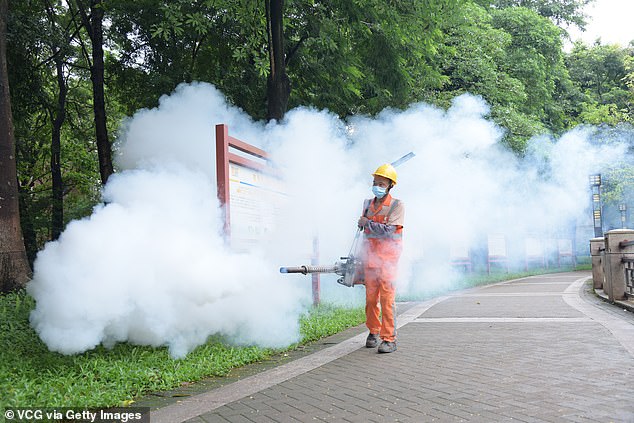The FDA has lifted a pause on the administration of a vaccine for the chikungunya virus, a mosquito-borne illness currently spreading from China.
The Ixchiq single-dose vaccine was approved for adults 18 and up at risk of exposure to the virus in 2023, when the CDC had recorded 152 travel-associated cases of the virus, the highest rate in four years.
But administrations of the shot to adults aged 60 and older were paused in May of this year, triggered by reports of 17 serious side effects following vaccination, including two deaths.
Most of the reported issues were neurological or cardiac, and all involved people over 60. Six cases were reported in the US, with the remaining cases among the tens of thousands of people vaccinated worldwide.
However, on August 7, the FDA greenlit the vaccine again for adults 60 and up. While the agency did not say whether the lifted pause is related to an uptick in infections, the chikungunya virus is spreading globally.
Cases are currently rising in China, with more than 10,000 recorded, and the virus is spreading to nearby countries, as well as Europe.
As of August 5, the CDC reports 46 cases of chikungunya virus in the US this year, all contracted by travelers returning from high-risk areas. No deaths have been reported.
The CDC recommends Americans traveling to high-risk chikungunya countries receive one of the two FDA-approved vaccines. However, the FDA changed its guidelines from recommending the shot to travelers and scientists at ‘increased risk’ to those at ‘high risk.’
An FDA spokesperson told DailyMail.com: ‘FDA has completed an updated benefit-risk assessment of Ixchiq, including for use in individuals 18 years of age and older.
‘Based on the available data and its benefit-risk assessment, FDA has removed the recommended pause in the use of Ixchiq in individuals 60 years of age and older.’
While there’s no specific number for how many Americans have been vaccinated for chikungunya, it’s known that around 43,000 people have received the vaccine globally.
The reported adverse reactions to the Ixchiq vaccine included severe headaches, dizziness, intense nerve pain, trouble with balance, fainting, extreme muscle aches, and severe joint and back pain.
The virus, meanwhile, causes flu-like symptoms within three to seven days of being bitten by a mosquito. A high fever is typical, as is joint pain in the hands, wrists, ankles and knees.
It also causes muscle pain, fatigue, nausea and vomiting, swollen joints and swollen lymph nodes.
Joint damage can be severe and long-lasting, potentially for years. Deaths are rare, but certain groups can experience life-threatening illness.
Newborns, the elderly, and people with chronic health conditions, including obesity and diabetes, are more susceptible to seizures and brain swelling, heart problems, and kidney or liver damage.
While the vaccine’s labeling has been changed to stipulate that only people at high risk of exposure should get the shot, limitations of use have been added.
A worker is shown spraying insecticide near a residential property in Hong Kong, where the first case of chikungunya was announced last week in a 12-year-old boy
The Ixchiq vaccine has been plagued by reports of severe neurological and cardiac side effects, including two deaths
The labeling now says: ‘Vaccination with Ixchiq is not advisable for most US travelers. For most US travelers, the risk of exposure to CHIKV is low.
‘The decision to administer Ixchiq should take into consideration an individual’s risk of severe or chronic disease outcomes if infected with CHIKV and risks of serious, severe, or prolonged chikungunya-like illness caused by vaccination with Ixchiq.’
The European vaccine company Valneva developed Ixchiq, the first-ever vaccine to prevent the chikungunya virus, in 2023.
But the shot has been plagued by reports of more than a dozen serious adverse events, including two deaths, in adults 62 to 89.
The European Medicines Agency suspended its use in May and the FDA soon followed.
A second chikungunya vaccine, Vimkunya, was approved by the FDA in February 2025.
The Ixchiq vaccine contains a weakened form of the virus, which may cause symptoms of chikungunya.
Federal officials said some of the severe adverse events reported are similar to severe complications from the disease.
According to Valneva, the FDA has received its petition to expand its availability to teenagers.
Chikungunya spreads through bites from the Aedes mosquito species, typically in countries where the virus is common, primarily those in Africa and Asia.
Twelve Americans were infected within US borders in 2014, while one infection was acquired in 2015. Since then, all US infections have been contracted abroad.
There have been about 220,000 Chikungunya virus cases and 80 related deaths in 14 countries since the beginning of 2025, according to the European Center for Disease Prevention and Control.
While it remains unclear in which countries American patients contracted the virus, the federal government has issued an elevated risk of exposure notice for Brazil, China Colombia, India, Mexico, Nigeria, Pakistan, Philippines and Thailand.
[…]
Click this link for the original source of this article.
Author: stuartbramhall
This content is courtesy of, and owned and copyrighted by, https://stuartbramhall.wordpress.com and its author. This content is made available by use of the public RSS feed offered by the host site and is used for educational purposes only. If you are the author or represent the host site and would like this content removed now and in the future, please contact USSANews.com using the email address in the Contact page found in the website menu.








